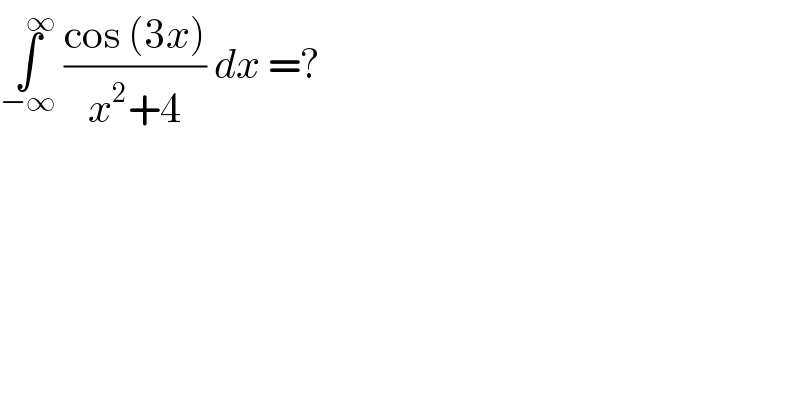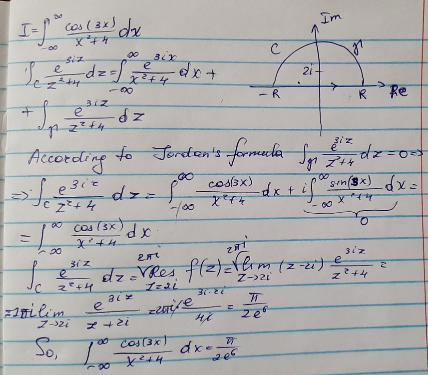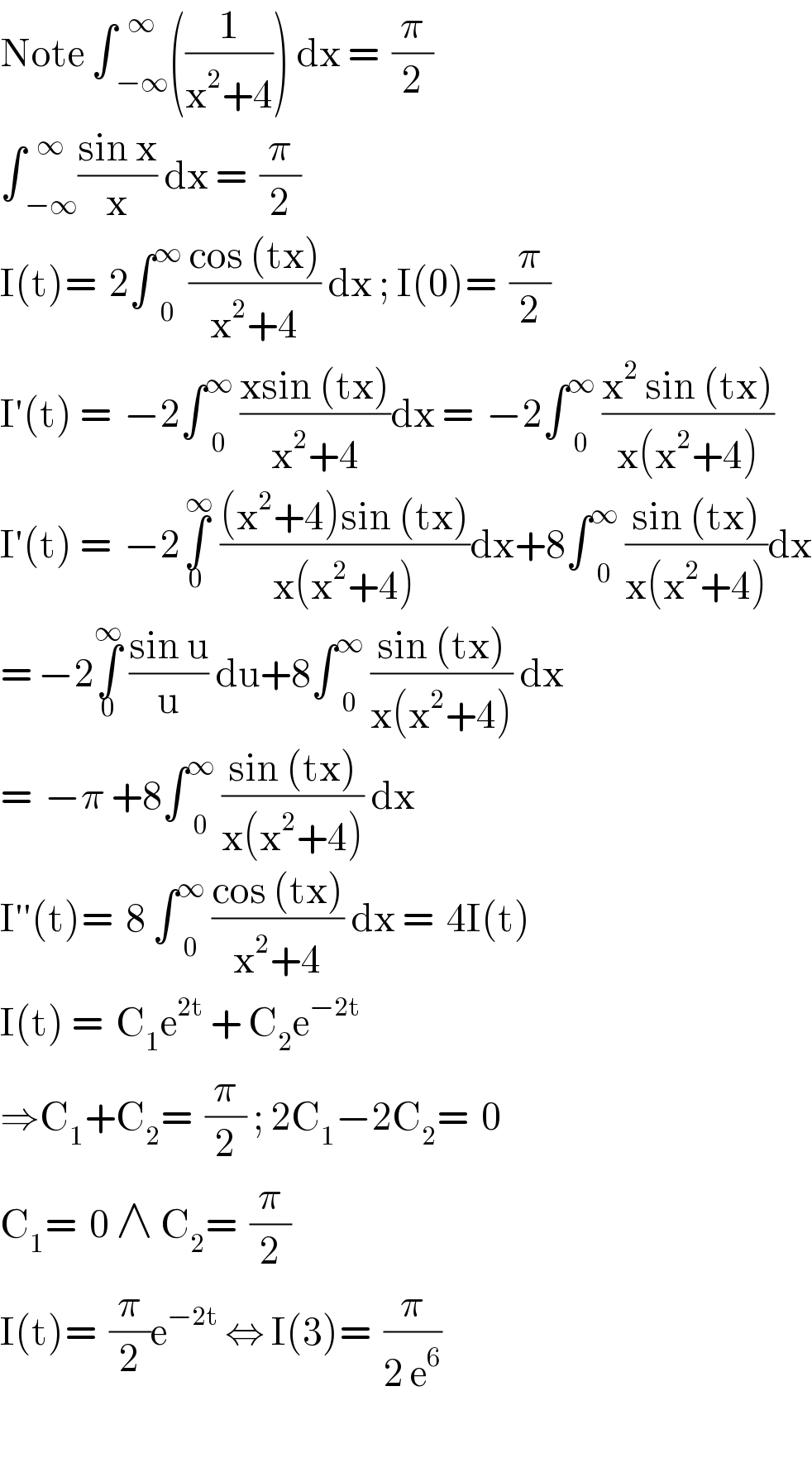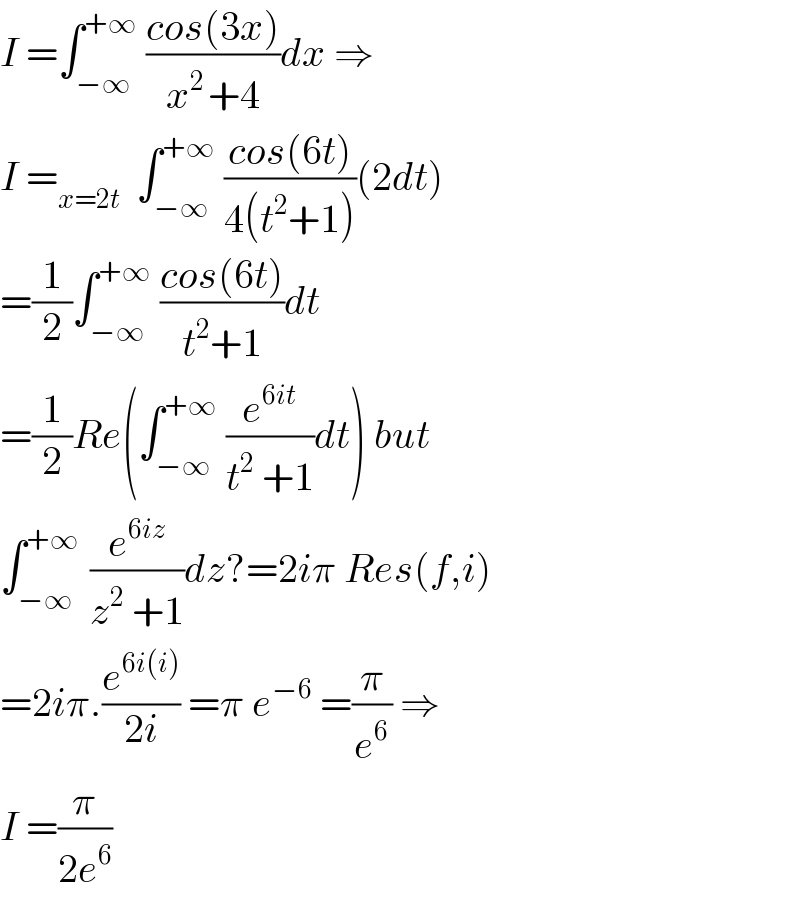
Question Number 117221 by bemath last updated on 10/Oct/20

$$\underset{−\infty} {\overset{\:\:\:\:\:\infty} {\int}}\:\frac{\mathrm{cos}\:\left(\mathrm{3}{x}\right)}{{x}^{\mathrm{2}} +\mathrm{4}}\:{dx}\:=? \\ $$
Commented by bemath last updated on 10/Oct/20

$${thank}\:{you}\:{sirs} \\ $$
Answered by AbduraufKodiriy last updated on 10/Oct/20

Answered by bobhans last updated on 10/Oct/20

$$\mathrm{Note}\:\int\underset{−\infty} {\overset{\infty} {\:}}\left(\frac{\mathrm{1}}{\mathrm{x}^{\mathrm{2}} +\mathrm{4}}\right)\:\mathrm{dx}\:=\:\:\frac{\pi}{\mathrm{2}} \\ $$$$\int\underset{−\infty} {\overset{\infty} {\:}}\frac{\mathrm{sin}\:\mathrm{x}}{\mathrm{x}}\:\mathrm{dx}\:=\:\:\frac{\pi}{\mathrm{2}} \\ $$$$\mathrm{I}\left(\mathrm{t}\right)=\:\:\mathrm{2}\int\underset{\mathrm{0}} {\overset{\infty} {\:}}\:\frac{\mathrm{cos}\:\left(\mathrm{tx}\right)}{\mathrm{x}^{\mathrm{2}} +\mathrm{4}}\:\mathrm{dx}\:;\:\mathrm{I}\left(\mathrm{0}\right)=\:\:\frac{\pi}{\mathrm{2}} \\ $$$$\mathrm{I}'\left(\mathrm{t}\right)\:=\:\:−\mathrm{2}\int\underset{\mathrm{0}} {\overset{\infty} {\:}}\:\frac{\mathrm{xsin}\:\left(\mathrm{tx}\right)}{\mathrm{x}^{\mathrm{2}} +\mathrm{4}}\mathrm{dx}\:=\:\:−\mathrm{2}\int\underset{\mathrm{0}} {\overset{\infty} {\:}}\:\frac{\mathrm{x}^{\mathrm{2}} \:\mathrm{sin}\:\left(\mathrm{tx}\right)}{\mathrm{x}\left(\mathrm{x}^{\mathrm{2}} +\mathrm{4}\right)} \\ $$$$\mathrm{I}'\left(\mathrm{t}\right)\:=\:\:−\mathrm{2}\underset{\mathrm{0}} {\overset{\:\infty} {\int}}\:\frac{\left(\mathrm{x}^{\mathrm{2}} +\mathrm{4}\right)\mathrm{sin}\:\left(\mathrm{tx}\right)}{\mathrm{x}\left(\mathrm{x}^{\mathrm{2}} +\mathrm{4}\right)}\mathrm{dx}+\mathrm{8}\int\underset{\mathrm{0}} {\overset{\infty} {\:}}\:\frac{\mathrm{sin}\:\left(\mathrm{tx}\right)}{\mathrm{x}\left(\mathrm{x}^{\mathrm{2}} +\mathrm{4}\right)}\mathrm{dx} \\ $$$$=\:−\mathrm{2}\underset{\mathrm{0}} {\overset{\infty} {\int}}\:\frac{\mathrm{sin}\:\mathrm{u}}{\mathrm{u}}\:\mathrm{du}+\mathrm{8}\int\underset{\mathrm{0}} {\overset{\infty} {\:}}\:\frac{\mathrm{sin}\:\left(\mathrm{tx}\right)}{\mathrm{x}\left(\mathrm{x}^{\mathrm{2}} +\mathrm{4}\right)}\:\mathrm{dx} \\ $$$$=\:\:−\pi\:+\mathrm{8}\int\underset{\mathrm{0}} {\overset{\infty} {\:}}\:\frac{\mathrm{sin}\:\left(\mathrm{tx}\right)}{\mathrm{x}\left(\mathrm{x}^{\mathrm{2}} +\mathrm{4}\right)}\:\mathrm{dx} \\ $$$$\mathrm{I}''\left(\mathrm{t}\right)=\:\:\mathrm{8}\:\int\underset{\mathrm{0}} {\overset{\infty} {\:}}\:\frac{\mathrm{cos}\:\left(\mathrm{tx}\right)}{\mathrm{x}^{\mathrm{2}} +\mathrm{4}}\:\mathrm{dx}\:=\:\:\mathrm{4I}\left(\mathrm{t}\right) \\ $$$$\mathrm{I}\left(\mathrm{t}\right)\:=\:\:\mathrm{C}_{\mathrm{1}} \mathrm{e}^{\mathrm{2t}} \:+\:\mathrm{C}_{\mathrm{2}} \mathrm{e}^{−\mathrm{2t}} \\ $$$$\Rightarrow\mathrm{C}_{\mathrm{1}} +\mathrm{C}_{\mathrm{2}} =\:\:\frac{\pi}{\mathrm{2}}\:;\:\mathrm{2C}_{\mathrm{1}} −\mathrm{2C}_{\mathrm{2}} =\:\:\mathrm{0} \\ $$$$\mathrm{C}_{\mathrm{1}} =\:\:\mathrm{0}\:\wedge\:\mathrm{C}_{\mathrm{2}} =\:\:\frac{\pi}{\mathrm{2}} \\ $$$$\mathrm{I}\left(\mathrm{t}\right)=\:\:\frac{\pi}{\mathrm{2}}\mathrm{e}^{−\mathrm{2t}} \:\Leftrightarrow\:\mathrm{I}\left(\mathrm{3}\right)=\:\:\frac{\pi}{\mathrm{2}\:\mathrm{e}^{\mathrm{6}} } \\ $$$$ \\ $$
Answered by Bird last updated on 11/Oct/20

$${I}\:=\int_{−\infty} ^{+\infty} \:\frac{{cos}\left(\mathrm{3}{x}\right)}{{x}^{\mathrm{2}\:} +\mathrm{4}}{dx}\:\Rightarrow \\ $$$${I}\:=_{{x}=\mathrm{2}{t}} \:\:\int_{−\infty} ^{+\infty} \:\frac{{cos}\left(\mathrm{6}{t}\right)}{\mathrm{4}\left({t}^{\mathrm{2}} +\mathrm{1}\right)}\left(\mathrm{2}{dt}\right) \\ $$$$=\frac{\mathrm{1}}{\mathrm{2}}\int_{−\infty} ^{+\infty} \:\frac{{cos}\left(\mathrm{6}{t}\right)}{{t}^{\mathrm{2}} +\mathrm{1}}{dt}\: \\ $$$$=\frac{\mathrm{1}}{\mathrm{2}}{Re}\left(\int_{−\infty} ^{+\infty} \:\frac{{e}^{\mathrm{6}{it}} }{{t}^{\mathrm{2}} \:+\mathrm{1}}{dt}\right)\:{but} \\ $$$$\int_{−\infty} ^{+\infty\:} \:\frac{{e}^{\mathrm{6}{iz}} }{{z}^{\mathrm{2}} \:+\mathrm{1}}{dz}?=\mathrm{2}{i}\pi\:{Res}\left({f},{i}\right) \\ $$$$=\mathrm{2}{i}\pi.\frac{{e}^{\mathrm{6}{i}\left({i}\right)} }{\mathrm{2}{i}}\:=\pi\:{e}^{−\mathrm{6}} \:=\frac{\pi}{{e}^{\mathrm{6}} }\:\Rightarrow \\ $$$${I}\:=\frac{\pi}{\mathrm{2}{e}^{\mathrm{6}} } \\ $$
